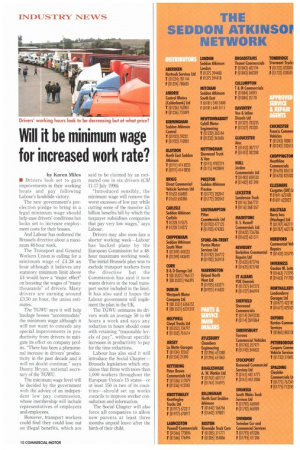Will it be minimum wage for increased work rate?
Page 12

If you've noticed an error in this article please click here to report it so we can fix it.
by Karen Miles III Drivers look set to gain improvements in their working hours and pay following Labour's landslide victory.
The new government's preelection pledge to bring in a legal minimum wage should help ease drivers' conditions but looks set to increase employment costs for their bosses.
And Labour has endorsed the Brussels directive about a maximum 48-hour week.
The Transport and General Workers Union is calling for a minimum wage of £4.38 an hour although it believes any statutory minimum limit above £4 would have a "major effect" on boosting the wages of "many thousands" of drivers. Many drivers are earning around £3.50 an hour, the union estimates.
The TGWU says it will help haulage bosses "accommodate" the minimum wage although it will not want to concede any special improvements in productivity from drivers to mitigate its effect on company profits. "There has been a phenomenal increase in drivers' productivity in the past decade and it will no doubt continue," says Danny Bryan, national secretary of the TGWU.
The minimum wage level will be decided by the government with the advice of an independent low pay commission, whose membership will include representatives of employers and employees.
However, transport workers could find they could lose out on illegal benefits, which are
said to be claimed by an estimated one in six drivers (CM 11-17 July 1996).
"Introduced sensibly, the minimum wage will remove the worst excesses of low pay while cutting some of the massive .C4 billion benefits bill by which the taxpayer subsidises companies that pay very low wages," says Labour.
Drivers may also soon face a shorter working week—Labour has backed plans by the European Commission for a 48hour maximum working week. The initial Brussels plan was to exclude transport workers from the directive but the Commission has said it now wants drivers in the road transport sector included in the limit. It has also said it hopes the Labour government will implement the plan in the UK.
The TGWU estimates its drivers work an average 58 to 60 hours a week and says any reduction in hours should come with retaining "reasonable levels of pay", without specific increases in productivity to pay for the time reductions.
Labour has also said it will introduce the Social Chapter— Brussels legislation which stipulates that firms with more than 1,000 workers throughout the European Union's 15 states—or at least 150 in two of its countries—should set up works councils to improve worker consultation and information.
The Social Chapter will also force all companies to allow new parents at least three months unpaid leave after the birth of their child.
































































































































